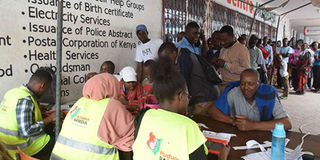Huduma Bill public participation a terrible flop

Huduma Namba registration at the Mombasa Huduma Centre on May 15, 2019. All chiefs, politicians and media personalities were engaged in raising awareness on the importance of registration. PHOTO | FILE | NATION MEDIA GROUP
What you need to know:
- It seeks to limit access to healthcare without Huduma Namba. For this reason, we need public participation at the grassroots.
The spirit of the 2010 Constitution envisioned an open, accountable and structured process where citizens can interact, exchange views and influence policy.
As much as Article 1 of the Constitution gives room for indirect participation through elected Members of Parliament, the Huduma Bill should be an exception.
Huduma Bill Public participation was a mockery of the spirit of public participation. The bill affects the entire population, as well as generations to come.
It seeks to limit access to healthcare without Huduma Namba. For this reason, we need public participation at the grassroots.
The July 31 public participation forum was an eye opener in terms of what to expect in the Huduma Namba and the National Integrated Identity Management System (NIIMS) as a whole.
Unfortunately, what the Ministry of Interior called public participation was more of ‘a boardroom meeting’.
VENUE
The forum was held at the Kenya School of Government in the Lower Kabete area of Nairobi. How accessible was this venue?
Even for a well-off citizen, getting to the venue with an Uber was not easy. Now think of ‘Wanjiku’, who is going to be affected with this bill, which limits the right to healthcare, education and financial services.
The drafters of the Public Participation Bill had already envisioned this limitation by location and had a provision on access to the necessary information and venue.
If this bill was an Act, it would have been easier to challenge the forum in court; challenging if the venue met the threshold of accessibility.
A venue like the KICC would have been preferable as it is central and accessible. This would have allowed more room for public participation.
In terms of in-person forums, the entire country had just this one chance – and we lost it.
MOBILISATION
Secondly, let’s reflect on the awareness on the public participation forum. The government only published a notice in the local dailies.
Let’s take a step back and review the process of the Huduma Namba registration. All chiefs, all politicians and every media personalities were engaged in raising awareness on the importance of registration.
Even our next of kin in the village became influencers calling on us to register lest we get deported to Timbuktu or God-knows-where.
Why was the government interested in registering the masses and when it came to the most important part – the bill that regulates how the information shall be collected and managed – there is little interest in making the public aware?
Was this intentional? Was this only a formality that could be used to rubber-stamp a flawed process?
TIMELINE
The Public Participation Bill of 2018 introduces another dimension to the discourse.
In it, a section discusses reasonable and meaningful opportunities for public participation. Using this as a lens to judge whether the July 31 public participation met the standards of public participation will clearly show that it did not.
The other aspect is about a realistic timeline. Is half a day of public forum and two weeks for submission of memorandums enough to qualify as realistic timeline for the Huduma Bill?
This Bill has a lot at stake as it will determine not only nationality, but also access to services and the right to freedom of movement and expression.
Public participation is crucial and should not be abused.
The writer is the Program Officer for Namati's Citizenship Programme




